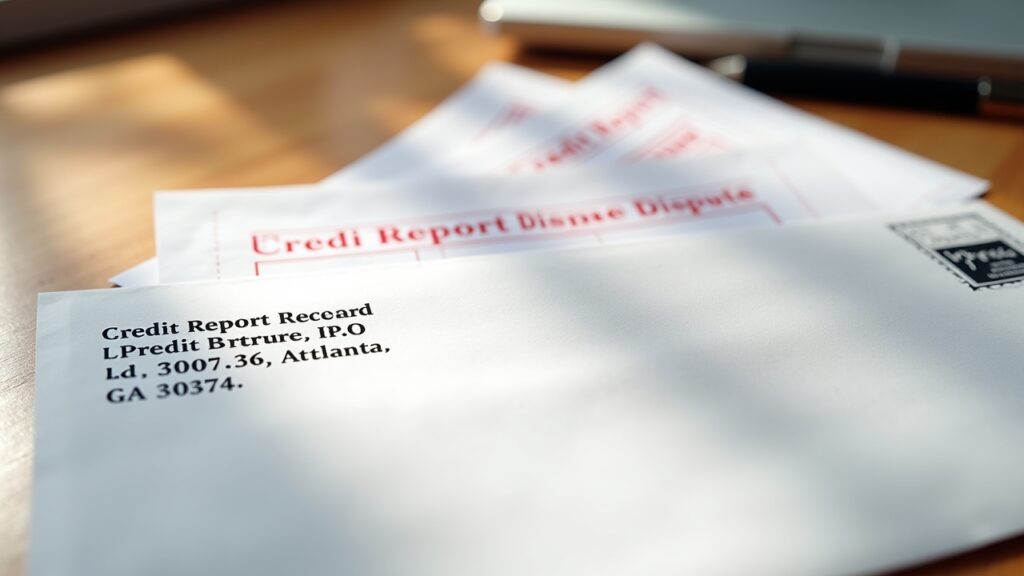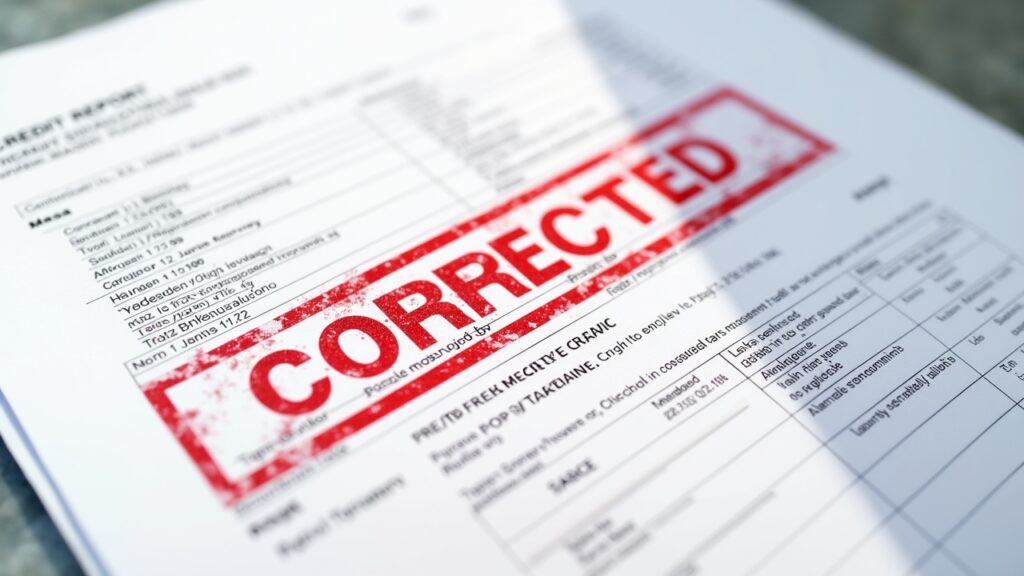Advertisements
Did you know that nearly 1 in 5 Americans have at least one error on their credit report? Yeah, I was shocked too when I discovered this stat from the Federal Trade Commission. Moreover, I was even more shocked when I found out I was part of that statistic!
Let me tell you, finding errors on your credit report feels like discovering someone’s been telling lies about you behind your back. Furthermore, these mistakes can seriously mess with your financial life. Trust me, I learned this the hard way when a simple error almost cost me my dream apartment.
My Wake-Up Call: When a Credit Error Almost Ruined Everything

So here’s what happened – I was applying for this gorgeous apartment downtown, feeling pretty confident about my finances. However, the landlord called me two days later saying my application was rejected due to “poor credit history.” What?!
Turns out, there was a $3,000 credit card debt listed on my report that wasn’t even mine. Additionally, it showed as being 90 days past due. My actual credit score had dropped by almost 100 points because of this phantom debt that belonged to someone with a similar name.
That’s when I realized I needed to learn how to dispute credit report inaccuracies, and fast. Subsequently, I dove deep into the process, made plenty of mistakes, but eventually got it fixed. Now I’m gonna share everything I learned so you don’t have to go through the same nightmare.
First Things First: Getting Your Credit Reports
Before you can fix errors, you gotta find ’em. Therefore, your first step is getting copies of your credit reports from all three major bureaus. You can get free reports once a year from AnnualCreditReport.com – and no, this isn’t one of those sketchy sites that secretly charges you.
Here’s a pro tip I wish someone had told me: don’t request all three reports at once. Instead, space them out every four months throughout the year. This way, you’re basically monitoring your credit for free year-round!
When my reports arrived, I printed them out and went through each one with a highlighter. Yeah, I know, very old school of me. But honestly, having physical copies made it easier to spot discrepancies between the different bureaus.
Common Credit Report Mistakes to Watch For
After going through this process myself (and helping several friends do the same), I’ve noticed certain errors pop up repeatedly. First off, incorrect personal information is super common – wrong addresses, misspelled names, or incorrect Social Security numbers.
Account errors are the real credit score killers though. These include accounts that aren’t yours, incorrect payment history, or accounts listed as open when they’re actually closed. Furthermore, duplicate accounts can make your debt look twice as bad as it really is.
One weird error I found on mine was a medical bill from a hospital in a state I’d never even visited. Apparently, medical debt errors are becoming increasingly common. Who knew?
The Step-by-Step Dispute Process That Actually Works
Alright, so you’ve found errors – now what? First, don’t panic like I did. Second, gather your documentation because the credit bureaus won’t just take your word for it.
Start by writing a dispute letter to each bureau reporting the error. Moreover, make it clear and concise – this isn’t the time for creative writing. State exactly what’s wrong and what the correct information should be. I learned to use phrases like “I am disputing this inaccurate information” rather than getting all emotional about it.
Include copies (never originals!) of supporting documents. For instance, when I disputed that phantom credit card debt, I included a letter from the actual creditor stating I’d never had an account with them. Additionally, always send everything via certified mail with return receipt requested – yeah, it costs a few bucks, but you need proof they received it.
What to Include in Your Dispute Package
- A clear dispute letter identifying each error
- Copies of your credit report with errors highlighted
- Supporting documentation (payment records, court documents, etc.)
- Copy of your driver’s license or state ID
- Proof of address (utility bill works great)
The bureaus have 30 days to investigate, though it sometimes takes longer. Meanwhile, you can also contact the creditor or information furnisher directly. I did both, which probably helped speed things up.
Online Disputes: The Faster (But Trickier) Option
Nowadays, you can dispute errors online through each bureau’s website. Honestly, it’s way faster than snail mail. However, there’s a catch – you might be limiting your rights under the Fair Credit Reporting Act when you dispute online.
I tried the online route first with Experian, and it worked fine for simple stuff. But for more complex disputes, the mail route gave me better results. Plus, having physical documentation just felt more official, ya know?
If you go the online route, make sure to screenshot everything. Subsequently, save all confirmation numbers and correspondence. The Consumer Financial Protection Bureau has great resources about both methods.
When Things Don’t Go as Planned
Here’s something nobody tells you – sometimes the credit bureaus will mark your dispute as “frivolous” and refuse to investigate. This happened to me with TransUnion, and I was furious! Turns out, I’d been too vague in my initial letter.
If your dispute gets rejected or the error isn’t fixed, don’t give up. Instead, file a complaint with the CFPB or your state’s attorney general. Moreover, you might need to consult with a consumer law attorney – many offer free consultations for credit report issues.
One mistake I made was not following up properly. After 30 days passed with no response from Equifax, I just assumed they were working on it. Wrong! Always follow up if you don’t hear back within the timeframe.
Your Financial Truth Matters

Looking back, I can’t believe I went years without checking my credit reports. Subsequently, that one error could’ve been sitting there for who knows how long, silently sabotaging my financial opportunities. Now I check my reports regularly, and you should too!
Remember, disputing credit report errors isn’t just about numbers on a page. It’s about ensuring your financial story is told accurately. Whether you’re applying for a mortgage, trying to get a business loan, or simply want peace of mind, having correct credit information is crucial.
Don’t let errors on your credit report hold you back from your financial goals. Take action today – get those free reports, review them carefully, and dispute any inaccuracies you find. Your future self will thank you!
Want to learn more about managing your finances and credit health? Check out other helpful articles on The Clear Cents where we break down complex financial topics into bite-sized, actionable advice. Because honestly, we all deserve to have our financial stories told accurately!



